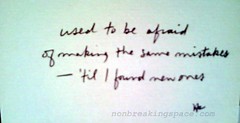You’ll remember that my Lent resolution this year to give up fear, inspired by my Twitter-buddy Jeanne who consistently inspires people with her utter lack of fear and her stubborn unwillingness to give in to it at any point.
Giving up on fear is at once much, much harder than you may first think and much, much easier, too.
–The Easy–
It’s easy to ‘say’ you’re giving up fear. It’s definitely a plus to be able to get the words out and feel emboldened by the commitment you’ve just made.
It’s easy to stop yourself fearing the everyday kind of things that used to bug you – it’s a conscious choice whether you’re going to allow yourself to worry about how you pay the bills or if your energy is better focused on how to generate the income that’s going to cover them. A fact that’s especially true for freelancers like me without a steady paycheque ((or paycheck for our American cousins)).
It’s easy to take advantage of the initial freedom that giving up fear brings you. It’s easy to float yourself away from the day-to-day issues and focus on your fear-free living–for the first week or so.
–The Hard–
It’s hard to genuinely beat your brain into submission when it tries to stir the old fear about those everyday items you shrugged off in the euphoria of your first few days or weeks. The rumbling in your subconscious feels like it’s never going to go away.
It’s hard to tackle the “new-found” fears that crop up without your being able to plan for them. You land a new job and you’re suddenly worried about being “the new guy”. How will you fit in, will you get on with your co-workers, will you be good at your job? All these things that life throws at us are wont to prompt a significant rise in our fear levels that isn’t easy to ignore.
It’s hard knowing that this new way of life is forever. There’s really no point in giving up fear for a few weeks or a month ((or 40 days)) – it’s a lifetime commitment. And that is scary.
–But, But, But–
When you’re successful, when you manage to rise above your fear, to master it, control it and stop it from being the boss of you, it becomes very, very difficult to revert back to your old ways. The idea of being scared becomes almost laughable when you think of your old fear of making that phone call, or attending that networking event on your tod or of introducing yourself to the hottie across the room who’s been making eyes at you all night.
When you truly commit to stepping up to the plate and facing Fear’s most crippling fastball, you can do so in the knowledge that you’ll swing for it, you’ll hit it and you’ll be running for home before you can say “I’m scared of getting my kit dirty”.





